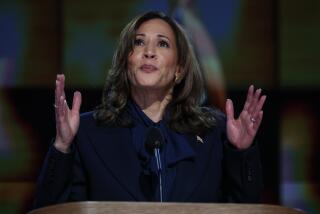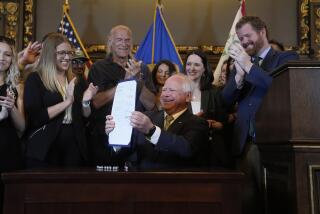In New Hampshire, Santorum sounding a lot like Pat Buchanan
As Rick Santorum attempts to capitalize on a near-victory in Iowa, he is tailoring his appeals to many of the same New Hampshire voters who backed conservative firebrand Patrick J. Buchanan in the 1990s.
Riding a black Dodge Ram pickup into the state’s conservative northland Thursday, Santorum put an affable face on a hard-edged message that bore more than passing resemblance to Buchanan’s pitchfork populism.
The former senator said that personal freedom was threatened by a cynical liberal plan to make most Americans dependent on handouts from big government — from healthcare to food stamps — in exchange for Democratic votes to keep the benefits and federal spending going.
Conservatives are imperiled “by a media, and by a culture and by Washington that continually fights against everything that we believe in, which is free people, free markets and free enterprise,” he told about 150 voters in an old wood-paneled train depot in Northfield.
He said he would be tough and bold enough to withstand the “grinding” that a conservative president would inevitably face from liberal forces. “Trust your head, your heart, your gut” in next week’s primary, he urged — not the polls, which have shown him trailing Newt Gingrich, Ron Paul and the leader, Mitt Romney.
Santorum, 53, brought up his Roman Catholic faith and roots in a working-class family in the coal and steel country around Pittsburgh. He offered his plan to eliminate corporate taxes on manufacturers, which he said would create good-paying jobs for “small-town America and blue-collar America.”
His well-received “victory” address in Iowa, late Tuesday night, sounded many of the same themes as his stump speeches, and reminded some former Buchanan aides of their man’s insurgent candidacy.
“It was the closest thing to Pat Buchanan’s economic populism and cultural conservatism, frankly, since Pat’s campaign,” said Greg Mueller, a former Buchanan advisor who is unaffiliated in the 2012 race.
Buchanan himself, barred by a cable TV contract from taking sides, praised Santorum’s remarks.
“It was ‘conservatism of the heart,’ ” the slogan from his own campaign, Buchanan said in a telephone interview.
Buchanan noted that he and Santorum are devout Catholics, and that Buchanan’s mother came from the same part of Pennsylvania. Both share similar views on social issues, including outspoken opposition to abortion. Santorum, a foe of same-sex marriage, drew jeers at a gathering of college students Thursday over the issue.
A woman in the audience asked whether the right to happiness was grounds for gay people to marry, and Santorum responded by asking whether she believed more than two people could have that right. “If you’re not happy unless you’re married to five other people, is that OK?” he asked, prompting boos from the audience.
Santorum’s national campaign manager, Mike Biundo, is a former Buchanan advisor. At the same time, though, Santorum “is much more pro-war,” said Buchanan, adding, with a laugh, “on that issue, I’m probably closer to my old friend, Ron Paul.”
Like Santorum, Buchanan ran strongly in Iowa’s GOP caucuses, where social and religious conservatives dominate. In 1996, Buchanan missed winning Iowa by 3 percentage points. His second-place finish, he said, provided “a tremendous boost” heading into New Hampshire, which he won.
In New Hampshire, evangelical voters are a small part of the Republican electorate, but Buchanan said the power of social conservatives and the state’s well-organized antiabortion movement were often underestimated.
The conservative commentator’s 1996 win was built on his 1992 run, when he drew 37% in a New Hampshire primary challenge to an incumbent president, George H.W. Bush.
Santorum is scrambling to become better known. But a shortage of campaign funds remains a hindrance. Despite the state’s reputation as a bastion of in-person politicking, primaries are now won largely on TV.
During the early 1990s, when the New Hampshire economy was depressed, the state was a fertile environment for Buchanan’s populism. The current jobless rate, by contrast, is the fourth-lowest in the country, at just over 5%.
Santorum also lacks the influential backing of the Union Leader newspaper in Manchester, which benefited Buchanan considerably. The paper’s endorsement of Gingrich will “cap Santorum’s opportunity” to take advantage of his Iowa success, said Mike Dennehy, a nonaligned strategist who managed John McCain’s 2008 state campaign.
Then there’s the stubborn independence of some primary voters. This week, Santorum came within a mere eight votes of winning Iowa, but that didn’t change Jean Esslinger’s mind. She first met Santorum six months ago and donated to his campaign. On Thursday, she introduced him to fellow Rotarians at a breakfast in Manchester. But he won’t get her vote.
“I want Ron Paul to be president,” the financial planner said.
A fractured field on the right — which has benefited Romney in the early going — is another factor.
Former Buchanan voter Roland Maheu, 73, who runs an insurance agency in Laconia, is trying to decide among Santorum, Paul and Gingrich. He heard Santorum speak for more than hour at the Merrimack Valley Railroad station, applauding repeatedly, including the former senator’s promise to “repeal ‘Obamacare.’ ”
Impressed, Maheu said afterward that he now considered Santorum “more to my way of thinking” and “could see myself voting for him.” But he added that he wanted to hear what Gingrich had to say at an event later in the day.
Santorum would get a big boost by finishing second next week, but he could easily wind up fourth. Keeping expectations in check, he told reporters that “people are getting excited about” his candidacy after the Iowa surge.
“Obviously, when Mitt Romney is at 40% in the polls, the chances in five days to make up a 35- or 40-point lead is going to be limited,” Santorum said. “But we expect to make a run and move up in those polls and show that we’re the candidate with momentum, and we’ll carry that into South Carolina.”
Evangelical Christians will play a big role in that state’s Jan. 21 primary. Santorum plans to campaign there Sunday.
More to Read
Sign up for Essential California
The most important California stories and recommendations in your inbox every morning.
You may occasionally receive promotional content from the Los Angeles Times.








